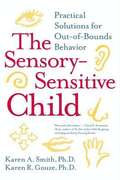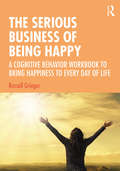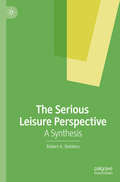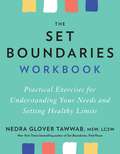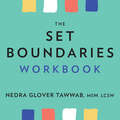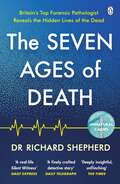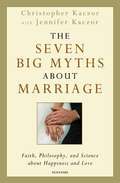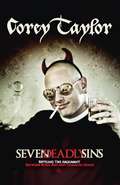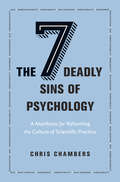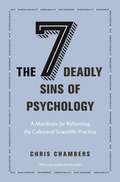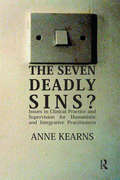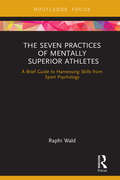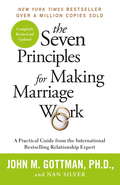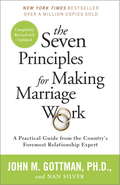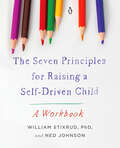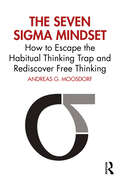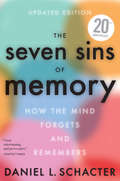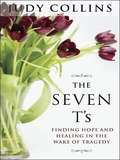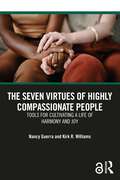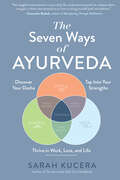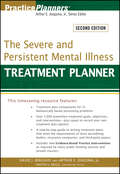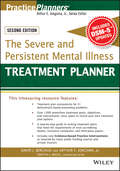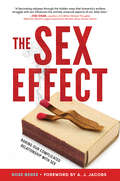- Table View
- List View
The Sensory Processing Disorder Answer Book: Practical Answers to the Top 250 Questions Parents Ask
by Tara DelaneyThe Sensory Processing Disorder Answer Book provides advice and answers to your most pressing questions about SPD. Written in a question and answer format, The Sensory Processing Disorder Answer Book helps you understand SPD, conquer your fears, and seek help for your child when necessary.
The Sensory-Sensitive Child
by Karen R. Gouze Karen A. SmithIn a book likely to transform how parents manage many of their child's daily struggles, Drs. Smith and Gouze explain the central and frequently unrecognized role that sensory processing problems play in a child's emotional and behavioral difficulties. Practicing child psychologists, and themselves parents of children with sensory integration problems, their message is innovative, practical, and, above all, full of hope. A child with sensory processing problems overreacts or underreacts to sensory experiences most of us take in stride. A busy classroom, new clothes, food smells, sports activities, even hugs can send such a child spinning out of control. The result can be heartbreaking: battles over dressing, bathing, schoolwork, social functions, holidays, and countless other events. In addition, the authors say, many childhood psychiatric disorders may have an unidentified sensory component. Readers Will Learn: The latest scientific knowledge about sensory integration How to recognize sensory processing problems in children and evaluate the options for treatment How to prevent conflicts by viewing the child's world through a "sensory lens" Strategies for handling sensory integration challenges at home, at school, and in twenty-first century kid culture The result: a happier childhood, a more harmonious family, and a more cooperative classroom. This thoroughly researched, useful, and compassionate guide will help families start on a new path of empowerment and success.
The Serious Business of Being Happy: A Cognitive Behavior Workbook to Bring Happiness to Every Day of Life
by Russell GriegerThe Serious Business of Being Happy combines scientific research and clinical experience to lay out a wealth of strategies to bring about happiness with oneself, other people, and daily life in general. Suitable for a wide range of mental health professionals, the book provides an applicable, comprehensive step-by-step approach to fulfilling a happy life. Chapters draw on Rational Emotive Behavior Therapy and Cognitive Behavior Therapy theory and practice to illustrate key areas where happiness can be maximized, including identifying life purpose and sacred principles, finding happiness with oneself, and finding happiness with others. Also included is a personalized "Happiness Action Plan," along with case examples, exercises, and reflections, to translate the ideas into concrete action. Leaving aside the psychobabble and feel-good clichés, The Serious Business of Being Happy is a valuable resource for practitioners working with individuals to build a positive psychology in everyday life.
The Serious Leisure Perspective: A Synthesis
by Robert A. StebbinsThe Serious Leisure Perspective (SLP) is a theoretic framework developed by Robert A. Stebbins in 1973, that brings together three main forms of leisure known as serious leisure, casual leisure, and project-based leisure. The SLP has evolved considerably since 1973, and this textbook provides a synthesis of the many concepts and propositions, as well as the data supporting them. In this overview, Stebbins organizes the entire framework along conceptual lines, with careful attention to level of empirical support and validation of each concept, presenting an up-to-date version of the SLP that allows interested students and researchers of social psychology, sociology, and leisure studies, to pinpoint exact elements of the theory, the empirical base and its application.
The Set Boundaries Workbook: Practical Exercises for Understanding Your Needs and Setting Healthy Limits
by Nedra Glover TawwabAn accessible, step-by-step resource for setting, communicating, and enforcing healthy boundaries at home, at work, and in life.We all want to have healthy boundaries. But what does that really mean - and what steps are needed to implement them in our daily lives? Sought-after therapist relationship expert Nedra Glover Tawwab presents clear explanations and interactive exercises to help you gain insight and then put it into action. Filled with thought-provoking checklists, questions, writing prompts, and more, THE SET BOUNDARIES WORKBOOK is a valuable tool for everyone who wants to speak up for what they want and need, and show up more authentically in the world.
The Set Boundaries Workbook: Practical Exercises for Understanding Your Needs and Setting Healthy Limits
by Nedra Glover TawwabAn accessible, step-by-step resource for setting, communicating, and enforcing healthy boundaries at home, at work, and in life.We all want to have healthy boundaries. But what does that really mean - and what steps are needed to implement them in our daily lives? Sought-after therapist relationship expert Nedra Glover Tawwab presents clear explanations and interactive exercises to help you gain insight and then put it into action. Filled with thought-provoking checklists, questions, writing prompts, and more, THE SET BOUNDARIES WORKBOOK is a valuable tool for everyone who wants to speak up for what they want and need, and show up more authentically in the world.
The Seven Ages of Death: ‘Every chapter is like a detective story’ Telegraph
by Dr Richard ShepherdThe heart-wrenchingly honest new book about life and death from forensic pathologist and bestselling author of UNNATURAL CAUSES, Dr Richard ShepherdA TIMES AND SUNDAY TIMES BOOK OF THE YEAR'Deeply insightful. Unflinching' THE TIMES'A finely-crafted detective story' DAILY TELEGRAPH'Enlightening, strangely uplifting' DAILY MAIL'Fascinating' DAILY EXPRESS_________Dr Richard Shepherd, a medical detective and Britain's top forensic pathologist, shares twenty-four of his most intriguing, enlightening and never-before-told cases.These autopsies, spanning the seven ages of human existence, uncover the secrets not only of how a person died, but also of how they lived.From old to young, murder to misadventure, and illness to accidental death, each body has something to reveal - about its owner's life story, how we age, justice, society, the certainty of death.And, above all, the wonderful marvel of life itself._________Praise for Dr Richard Shepherd'Gripping, grimly fascinating, and I suspect I'll read it at least twice' Evening Standard'A deeply mesmerising memoir of forensic pathology. Human and fascinating' Nigella Lawson'An absolutely brilliant book. I really recommend it, I don't often say that but it's fascinating' Jeremy Vine, BBC Radio 2'Puts the reader at his elbow as he wields the scalpel' Guardian'Fascinating, gruesome yet engrossing' Richard and Judy, Daily Express'Fascinating, insightful, candid, compassionate' Observer
The Seven Big Myths about Marriage: What Science, Faith, and Philosophy Teach Us about Love and Happiness
by Christopher Kaczor Jennifer KaczorThis work explores some of the most interesting and vexing issues concerning contemporary marriage, including contraception, reproductive technology, and divorce. Appealing to reason rather than religious authority, the book tackles the most controversial and talked about moral teachings of the Catholic Church and argues for their reasonableness.
The Seven Deadly Sins
by Corey TaylorFor the first time, Slipknot and Stone Sour frontman Corey Taylor speaks directly to his fans and shares his worldview about life as a sinner. And Taylor knows how to sin. As a small-town hero in the early '90s, he threw himself into a fierce-drinking, drug-abusing, hard-loving, live-for-the moment life. Soon Taylor's music exploded, and he found himself rich, wanted, and on the road. His new and ever-more extreme lifestyle had an unexpected effect, however; for the first time, he began to actively think about what it meant to sin and whether sinning could--or should--be recast in a different light. Seven Deadly Sins is Taylor's personal story, but it's also a larger discussion of what it means to be seen as either a "good" person or a "bad" one. Yes, Corey Taylor has broken the law and hurt people, but, if sin is what makes us human, how wrong can it be?
The Seven Deadly Sins of Psychology: A Manifesto for Reforming the Culture of Scientific Practice
by Chris ChambersWhy psychology is in peril as a scientific discipline—and how to save itPsychological science has made extraordinary discoveries about the human mind, but can we trust everything its practitioners are telling us? In recent years, it has become increasingly apparent that a lot of research in psychology is based on weak evidence, questionable practices, and sometimes even fraud. The Seven Deadly Sins of Psychology diagnoses the ills besetting the discipline today and proposes sensible, practical solutions to ensure that it remains a legitimate and reliable science in the years ahead.In this unflinchingly candid manifesto, Chris Chambers draws on his own experiences as a working scientist to reveal a dark side to psychology that few of us ever see. Using the seven deadly sins as a metaphor, he shows how practitioners are vulnerable to powerful biases that undercut the scientific method, how they routinely torture data until it produces outcomes that can be published in prestigious journals, and how studies are much less reliable than advertised. He reveals how a culture of secrecy denies the public and other researchers access to the results of psychology experiments, how fraudulent academics can operate with impunity, and how an obsession with bean counting creates perverse incentives for academics. Left unchecked, these problems threaten the very future of psychology as a science—but help is here.Outlining a core set of best practices that can be applied across the sciences, Chambers demonstrates how all these sins can be corrected by embracing open science, an emerging philosophy that seeks to make research and its outcomes as transparent as possible.
The Seven Deadly Sins of Psychology: A Manifesto for Reforming the Culture of Scientific Practice
by Chris ChambersWhy psychology is in peril as a scientific discipline—and how to save itPsychological science has made extraordinary discoveries about the human mind, but can we trust everything its practitioners are telling us? In recent years, it has become increasingly apparent that a lot of research in psychology is based on weak evidence, questionable practices, and sometimes even fraud. The Seven Deadly Sins of Psychology diagnoses the ills besetting the discipline today and proposes sensible, practical solutions to ensure that it remains a legitimate and reliable science in the years ahead. In this unflinchingly candid manifesto, Chris Chambers shows how practitioners are vulnerable to powerful biases that undercut the scientific method, how they routinely torture data until it produces outcomes that can be published in prestigious journals, and how studies are much less reliable than advertised. Left unchecked, these and other problems threaten the very future of psychology as a science—but help is here.
The Seven Deadly Sins?: Issues in Clinical Practice and Supervision for Humanistic and Integrative Practitioners
by Anne KearnsThe Seven Deadly Sins? grew out of a post-qualification training course of the same name. It aims to make more accessible some concepts from the world of psychoanalysis, self-psychology and affective neuroscience, as well as commenting on the challenge of working "in the real world". This is achieved by offering an integrative and anecdotal perspective on issues that have been generally un- or under-explored in trainings that have a humanistic emphasis, issues such as envy, shame, love and hate, trauma, addiction, money, and eating disorders. These issues are illustrated through the judicious use of clinical case studies. Various "maps" are provided to assist the supervisor and clinician in holding opposing diagnostic models and in working with psychotherapy and counselling trainees.The chapters can be read in isolation, which makes the book an ideal tool for the supervisor and clinician to use in response to specific issues.
The Seven Practices of Mentally Superior Athletes: Harnessing Skills from Sport Psychology
by Raphael WaldOnce athletes reach the highest levels of competition in college and professional sports, the mental aspect of the game becomes increasingly vital to performance. The Seven Practices of Mentally Superior Athletes is a short and snappy reference text intended for repeated use that explains the importance of the mental side of the game and offers concise advice for improvement. Wald outlines the most important sport psychology skills in a way that can be easily understood and applied to athletes regardless of what sport they play. It also features illustrative stories that demonstrate exactly how these skills can be applied on the field, court, course, or arena. This book is particularly helpful to busy athletes with demanding lifestyles. It will also be useful for coaches who want to continue their education and learn more about sport psychology and how to implement these mental training habits with their athletes.
The Seven Primal Questions: Take Control of the Hidden Forces That Drive You
by Mike FosterThe Seven Primal Questions is a revolutionary new framework to understand everything about you and your relationships. The book is a practical guide to help you maximize your life by understanding your internal programming. The Primal Question is the thing underneath the thing that drives everything. And once you discover it, you can quickly overcome the challenges that have been holding you back for far too long. The book is based on over 6000 hours of one-on-one interviews on emotional needs, attachment and what makes someone supernaturally great at what they do. In the book you’ll learn which of the unique seven primal questions drives your life. You’ll also uncover your Primal Gift which is your hidden superpower that gives you an unfair advantage in life. The book will also clearly show you how your Primal Question can benefit your marriage, parenting and leadership. Take a free Primal Question Assessment at PrimalQuestion.com to better understand the forces that drive you.
The Seven Principles For Making Marriage Work
by John GottmanThe revolutionary guide to show couples how to create an emotionally intelligent relationship - and keep it on trackStraightforward in its approach, yet profound in its effect, the principles outlined in this book teach partners new and startling strategies for making their marriage work. Gottman has scientifically analysed the habits of married couples and established a method of correcting the behaviour that puts thousands of marriages on the rocks. He helps couples focus on each other, on paying attention to the small day-to-day moments that, strung together, make up the heart and soul of any relationship. Packed with questionnaires and exercises whose effectiveness has been proven in Dr Gottman's workshops, this is the definitive guide for anyone who wants their relationship to attain its highest potential.
The Seven Principles for Making Marriage Work: A Practical Guide from the Country's Foremost Relationship Expert
by Nan Silver John GottmanNEW YORK TIMES BESTSELLER • Over a million copies sold! &“An eminently practical guide to an emotionally intelligent—and long-lasting—marriage.&”—Daniel Goleman, author of Emotional Intelligence The Seven Principles for Making Marriage Work has revolutionized the way we understand, repair, and strengthen marriages. John Gottman&’s unprecedented study of couples over a period of years has allowed him to observe the habits that can make—and break—a marriage. Here is the culmination of that work: the seven principles that guide couples on a path toward a harmonious and long-lasting relationship. Straightforward yet profound, these principles teach partners new approaches for resolving conflicts, creating new common ground, and achieving greater levels of intimacy. Gottman offers strategies and resources to help couples collaborate more effectively to resolve any problem, whether dealing with issues related to sex, money, religion, work, family, or anything else. Packed with new exercises and the latest research out of the esteemed Gottman Institute, this revised edition of The Seven Principles for Making Marriage Work is the definitive guide for anyone who wants their relationship to attain its highest potential.
The Seven Principles for Raising a Self-Driven Child: A Workbook
by Ned Johnson William Stixrud PhDFrom the authors of What Do You Say? and The Self-Driven Child, a workbook of vital practices and step-by-step resources for parents striving to raise self-motivated, secure, and joyfully driven childrenA guide to move from understanding the science and value behind nonanxious parenting to developing and sharpening the essential skills parents need to be a trusted resource for growing kids.Authors William Stixrud and Ned Johnson have watched firsthand as the crisis around education and the mental health crisis in childhood have converged in the postpandemic years. Their book The Self-Driven Child was ahead of the curve in addressing the way these forces converge in adolescents at pivotal moments as children develop their sense of autonomy, ambition, self-discipline, and learning style. As the authors have continued to lecture on the book&’s subject, parents have again and again homed in on the value of the model dialogues and practice prompts.Using material from their current work with parents and children, and pulling essential principles from the science in The Self-Driven Child, this workbook guides parents to develop the practice of being a nonanxious presence in children&’s lives, as well as introducing essential skills for navigating the pressure cooker of school. With prompts to help parents diagnose and rewire their instinctual responses to stressful situations, exercises to give them the language to communicate clearly and calmly, and lists to keep anxiety responses in check and big-picture goals in view, this workbook will bring peace and clarity to parents and educators seeking to support the unique path each child traverses on the road to growing up.
The Seven Sigma Mindset: How to Escape the Habitual Thinking Trap and Rediscover Free Thinking
by Andreas G. MoosdorfLearn to retrain your mind and become more creative and productive with this step-by-step guide to replacing habitual thinking with free thinking.Unless you can name six thoughts you had today that you haven’t had before, you are a habitual thinker 99.9% of the time, just like everyone else. This is because our hard-wired survivor bias drives us to repeat mental patterns and solutions that seemed sensible in the past, and that provide comfort, social rewards and a stable identity. This means that our thinking follows a Six Sigma distribution and that only a tiny fraction of our daily thoughts are truly novel and free, which prevents us from reaching the groundbreaking solutions we need to adapt to a fast-changing world. But in this book, Andreas G. Moosdorf guides you to perceive your own habitual thinking more clearly and explore the vast, untapped potential of your own mind. Through a wealth of exercises, readers will rediscover forgotten resources, perspectives, and choices, and be empowered to take back the wheel in their own work and lives.Ditch your mental maps, rediscover the seven sigma of your thinking, and dive into a forgotten world of variability, productivity and deeper satisfaction with the Seven Sigma Mindset.
The Seven Sins of Memory: How the Mind Forgets and Remembers
by Daniel L. SchacterA New York Times Notable Book: A psychologist&’s &“gripping and thought-provoking&” look at how and why our brains sometimes fail us (Steven Pinker, author of How the Mind Works). In this intriguing study, Harvard psychologist Daniel L. Schacter explores the memory miscues that occur in everyday life, placing them into seven categories: absent-mindedness, transience, blocking, misattribution, suggestibility, bias, and persistence. Illustrating these concepts with vivid examples—case studies, literary excerpts, experimental evidence, and accounts of highly visible news events such as the O. J. Simpson verdict, Bill Clinton&’s grand jury testimony, and the search for the Oklahoma City bomber—he also delves into striking new scientific research, giving us a glimpse of the fascinating neurology of memory and offering &“insight into common malfunctions of the mind&” (USA Today). &“Though memory failure can amount to little more than a mild annoyance, the consequences of misattribution in eyewitness testimony can be devastating, as can the consequences of suggestibility among pre-school children and among adults with &‘false memory syndrome&’ . . . Drawing upon recent neuroimaging research that allows a glimpse of the brain as it learns and remembers, Schacter guides his readers on a fascinating journey of the human mind.&” —Library Journal &“Clear, entertaining and provocative . . . Encourages a new appreciation of the complexity and fragility of memory.&” —The Seattle Times &“Should be required reading for police, lawyers, psychologists, and anyone else who wants to understand how memory can go terribly wrong.&” —The Atlanta Journal-Constitution &“A fascinating journey through paths of memory, its open avenues and blind alleys . . . Lucid, engaging, and enjoyable.&” —Jerome Groopman, MD &“Compelling in its science and its probing examination of everyday life, The Seven Sins of Memory is also a delightful book, lively and clear.&” —Chicago Tribune Winner of the William James Book Award
The Seven T's
by Judy CollinsBeloved singer-songwriter Judy Collins draws on her personal experience with her son's suicide to guide readers through grieving the loss of a loved one who has died under tragic circumstances. The death of a loved one is always painful and the grieving process complex and profound. Yet when the loss occurs under tragic circumstances, there is a whole other set of emotional variables that the people left behind must face. Questions abound, such as "Could I have stopped this?" Feelings of guilt, shame, and even anger combine with the overwhelming sadness of losing someone who was dearly loved. Drawing on her own experience of losing her son to suicide, as well as her conversations with hundreds of people who have grieved the tragic death of a friend or family member, revered singer-songwriter Judy Collins has culled together seven powerful steps toward healing. The Seven T's are: TRUTH: Tell it. Regardless of how terrible the facts may be and how hard it is to talk about, don't hide the truth about how you lost the person you loved. TRUST: Allow it. Don't let the painful circumstances surrounding the death of your loved one prevent you from talking with friends about your loss. THERAPY: Get it. Seek help-whether through traditional talk therapy, your art, meditation, or whatever method you choose-but get the help you need. TREASURE: Hold on. Don't stop treasuring your loved one. Don't let the horrible events leading to his or her death wash away all of the things that were good and beautiful about that person's life. THRIVE: Keep living with your eyes wide open. Don't give in to the temptation to use alcohol or any other addiction to blunt or blur your sadness. TREAT: Be kind to yourself. Give yourself the gift of self-nourishment. TRIUMPH: You must. Live a life of joy, abundance, and forgiveness. From a woman famous for her wisdom and compassion, The Seven T's is destined to become a classic on the subject of grieving and loss.
The Seven Virtues of Highly Compassionate People: Tools for Cultivating a Life of Harmony and Joy
by Nancy Guerra Kirk R. WilliamsWhat are the practical implications of truly caring about yourself and others, of approaching each day with an open mind, an open heart, and a desire to reduce the suffering of all living beings? Can we learn compassion as a way of life, as an antidote to violence and cruelty? In The Seven Virtues of Highly Compassionate People, social scientists Nancy Guerra and Kirk R. Williams provide easy-to-follow steps to help you understand the what, the why, and the how of compassion. They bring together cutting-edge research, inspiring spiritual teachings, and their own life experiences to help you bring compassion front and center in your life. Not only is compassion good for you and those around you, but it is the key to a more peaceful and just world.“The Open Access version of this book, available at http://www.taylorfrancis.com, has been made available under a Creative Commons [Attribution-Non Commercial-No Derivatives (CC-BY-NC-ND)] 4.0 license. Funded by The Living Peace Foundation.”
The Seven Ways of Ayurveda: Discover Your Dosha, Tap Into Your Strengths--and Thrive In Work, Love, And Life
by Sarah KuceraA guide to the Ayurvedic personality types, or doshas, with psychology-based advice on cultivating balance, from the author of The Ayurvedic Self-Care Handbook At the core of Ayurveda is an understanding that we are all made of the same materials—the five elements of ether (space), air, fire, water, and earth—and how you look, think, and feel can be traced back to your unique proportion of these elements at any given time. This is your dosha, the true essence of who you are. Knowing your dosha is the key to deeper self-knowledge, easier relationships, and a happier future. In The Seven Ways of Ayurveda, you’ll discover which type fits you best. Vata: creator, multitasker, artist Pitta: perfectionist, challenger, leader Kapha: peacemaker, nurturer, lover Vata-Pitta: performer, innovator, first responder Pitta-Kapha: guardian, moralist, observer Vata-Kapha: dreamer, supporter, conversationalist Tri-Dosha: proficient in all trades, well-rounded Then, you’ll identify your innate strengths (and their “shadow sides”); whether you’re out of balance (and what to do); how your unique type approaches work, love, travel, and more; and how to forge true, mutual understanding with friends and loved ones whose doshas may differ. When you know yourself better, you can take better care of yourself—and others, too.
The Severe and Persistent Mental Illness Treatment Planner
by Timothy J. Bruce Arthur E. Jongsma Jr. David J. BerghuisThe flexible format of The Severe and Persistent Mental Illness Treatment Planner, 2nd Edition enables you to choose between evidence based and traditional "best practice" treatment approaches for your patients. Fully revised to meet your needs as a mental health professional working in today's long-term care facilities, this time-saving resource contains over 1,000 rewritten treatment goals, objectives, and interventions, plus space for recording specific treatment plan options. This guide is organized around 31 behaviorally based issues, from employment problems and family conflicts, to financial needs and homelessness, to intimate relationship conflicts and social anxiety.
The Severe and Persistent Mental Illness Treatment Planner (PracticePlanners)
by Timothy J. Bruce Arthur E. Jongsma Jr. David J. BerghuisThis timesaving resource features: Treatment plan components for 31 behaviorally based presenting problems Over 1,000 prewritten treatment goals, objectives, and interventions—plus space to record your own treatment plan options A step-by-step guide to writing treatment plans that meet the requirements of most accrediting bodies, insurance companies, and third-party payors Includes new Evidence-Based Practice Interventions as required by many public funding sources and private insurers PracticePlanners® THE BESTSELLING TREATMENT PLANNING SYSTEM FOR MENTAL HEALTH PROFESSIONALS The Severe and Persistent Mental Illness Treatment Planner, Second Edition provides all the elements necessary to quickly and easily develop formal treatment plans that satisfy the demands of HMOs, managed care companies, third-party payors, and state and federal agencies. New edition features empirically supported, evidence-based treatment interventions Organized around 31 main presenting problems, including employment problems, family conflicts, financial needs, homelessness, intimate relationship conflicts, and social anxiety Over 1,000 prewritten treatment goals, objectives, and interventions—plus space to record your own treatment plan options Easy-to-use reference format helps locate treatment plan components by behavioral problem Designed to correspond with The Severe and Persistent Mental Illness Progress Notes Planner, Second Edition Includes a sample treatment plan that conforms to the requirements of most third-party payors and accrediting agencies (including CARF, The Joint Commission, COA, and NCQA) Additional resources in the PracticePlanners® series: Progress Notes Planners contain complete, prewritten progress notes for each presenting problem in the companion Treatment Planners. Documentation Sourcebooks provide the forms and records that mental health professionals need to efficiently run their practice. For more information on our PracticePlanners®, including our full line of Treatment Planners, visit us on the Web at: www.wiley.com/practiceplanners
The Sex Effect: Baring Our Complicated Relationship with Sex
by A. J. Jacobs Ross BenesA gripping exploration of the relationship between sex and our society, with a foreword by bestselling author A.J. JacobsWhy do political leaders become entangled in so many sex scandals? How did the U.S. military inadvertently help make San Francisco a mecca of gay culture? And what was the original purpose of vibrators? Find out the answers to all these questions and more as journalist Ross Benes delves into the complicated relationship between everyday human life—including religion, politics, and technology—and our sexuality.Drawing on history, psychology, sociology, and more, The Sex Effect combines innovative research and analysis with captivating anecdotes to reveal just how much sex shapes our society—and what it means for us as humans as we continue to struggle with the wide-ranging effects our sexuality has on the world around us.

